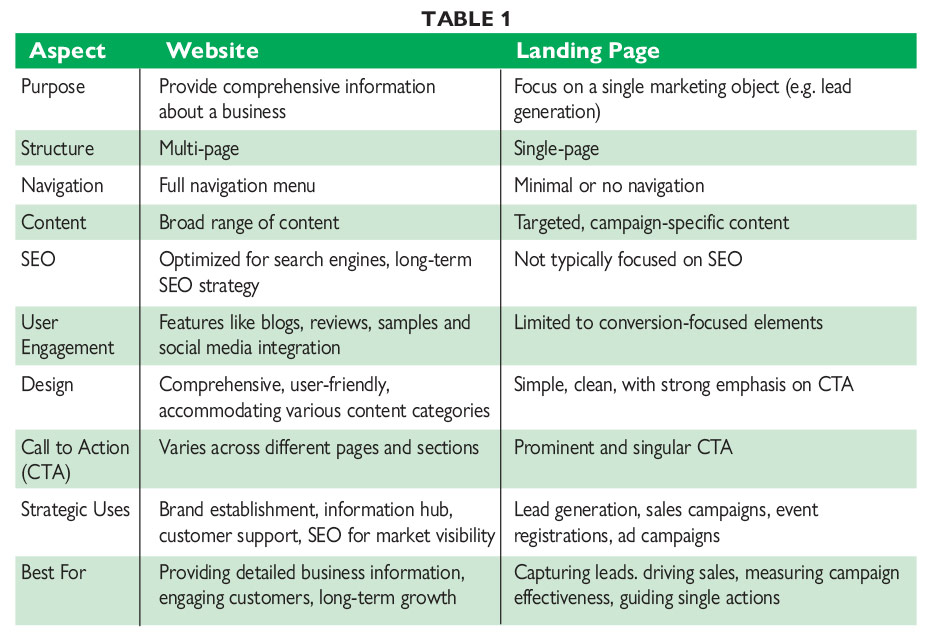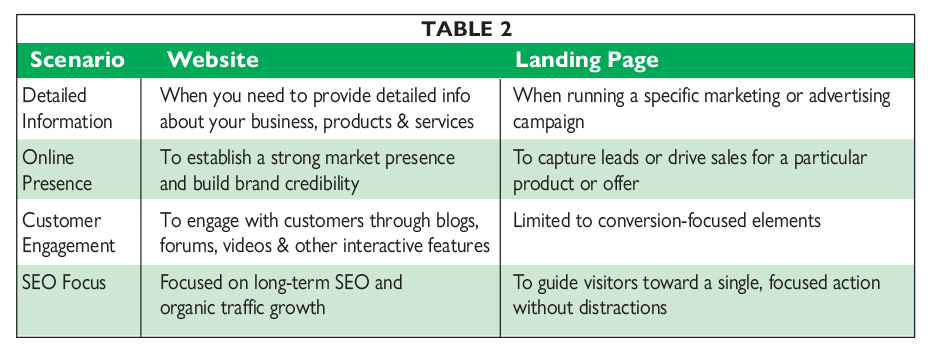Website Versus Landing Page
Understanding the Difference and Strategic Uses
Alyssa McKenna
North Star Productions
Understanding the difference between a landing page and a website can significantly benefit your business. Do you know the difference? If not, that’s OK! After you read this, you will know it all!
The terms “website” and “landing page” are often used interchangeably. Kind of like granite and quartz.
However, they serve distinct purposes and impact your overall marketing strategy differently.
Website: Your website serves as the foundation of your online presence, providing comprehensive information and engaging content to build trust and credibility.
Landing page: A landing page is a targeted tool designed to convert visitors into leads or customers through focused content and clear calls to action.
By understanding the differences between websites and landing pages and strategically using each to their strengths, you can enhance your digital marketing efforts, improve user experience, and achieve your business goals more effectively.
In this article we will talk about the differences between the two, when to use it and how landing pages convert more than websites.
Let’s dig in!
What is a Website?
A website is a collection of interconnected web pages that exist under a single domain name. It is designed to provide comprehensive information about a business, organization, or individual, offering a wide range of content and resources.
Five Key Features of a Website
1. Multi-Page Structure: Websites typically consist of multiple pages, including a homepage, about page, contact page, product or service pages, blog, and more.
2. Navigation Menu: Websites have a navigation menu that allows users to move between different pages and
sections easily.
3. Broad Content: Websites provide
detailed information about various aspects of a business, from its history and mission to its products, services,
and blog content.
4. SEO Optimization: Websites are often optimized for search engines to attract organic traffic. This includes on-page SEO, technical SEO, and content marketing strategies.
5. User Engagement: Websites may include features like user accounts, comment sections, forums, and social media integration to engage visitors.
Strategic Uses of a Website
• Brand Establishment: A website helps establish a brand’s identity and credibility. It serves as the digital face of a business and provides a central hub for all online activities.
• Information Hub: It acts as a hub of information where potential customers can learn everything they need to know about your business.
• SEO and Content Marketing: A well-optimized website can attract organic traffic from search engines, helping to generate leads and increase visibility.
• Customer Support: Websites can offer features like FAQs, live chat, and support tickets.
What is a Landing Page?
A landing page, on the other hand, is a standalone web page created specifically for a marketing or advertising campaign. Its primary purpose is to convert visitors into leads or customers by encouraging them to take a specific action.
Having multiple offers on a single landing page can decrease conversions by up to 266%. It’s better to focus on one clear offer per page to avoid confusing visitors. – Source: GrowthMarketingPro.com
Five Key Features of an Effective Landing Page
1. Single-Page Focus: Landing pages are single-page sites that focus on a single objective, such as capturing leads or driving sales.
2. Targeted Content: The content on a landing page is highly targeted to a specific audience or campaign, with a clear and concise message.
3. Call to Action (CTA): Landing pages prominently feature a call to action, such as “Sign Up Now,” “Download the Guide,” or “Buy Now.”
4. Minimal Navigation: To keep visitors focused on the desired action, landing pages usually have minimal or no navigation links that could lead visitors away.
5. Conversion Optimization: Landing pages are optimized for conversions, employing strategies like A/B testing, persuasive copywriting, and user-friendly design.
Strategic Uses of a Landing Page
• Lead Generation: Landing pages are ideal for capturing leads through forms/sign-ups.
• Sales Campaigns: They can drive sales by highlighting a specific product or offer with compelling CTAs.
• Event Registrations: Landing pages are effective for promoting events and capturing registrations.
• Ad Campaigns: When running Pay Per Click (PPC) or social media ads, landing pages provide a dedicated destination for ad traffic, increasing the chances of conversion.
Advantages of Landing Pages?
Turn Leads Into Customers!
• Focused Content:
— They are crafted around a specific marketing goal, whether it’s capturing leads, promoting a product, or driving sales.
— By eliminating unnecessary links and distractions, landing pages keep the visitor’s attention on the desired action.
• Minimal Distractions:
— By minimizing navigation options and external links, landing pages keep the visitor’s attention, reducing the chances of distraction and improving conversion rates.
• Calls To Action
— Designed to prompt the visitor to take a specific action.
Here are some calls to action:
“Start Your Project Now”
“Get a Custom Design Plan”
“Find Your Perfect Countertop”
“Request a Sample”
“Get Your Free Quote Today!”
• Visual and Interactive Elements
— Incorporating visual elements such as videos and images can also enhance the effectiveness of a landing page.
— Videos, in particular, are highly engaging and can convey information quickly and effectively.
• Reporting
— Monitor performance and identify areas for improvement.
— Continuously test different versions of your landing page to see what works best.
• Social Proof and Trust Signals
— Monitor performance and identify areas for improvement.
— Continuously test different versions of your landing page to see what works best.
— “Including testimonials on a landing page can boost conversions by up to 34%.” — Source: www.VWO.com
Understanding the distinct roles and strategic uses of websites and landing pages is crucial for optimizing your digital marketing efforts. By leveraging each for their unique strengths, you can enhance user experience, increase engagement, and ultimately achieve your business goals more effectively. So, whether you’re looking to build brand credibility or convert visitors into leads, knowing when and how to use these tools will set you on the path to success!
 |
|
Above: Table 1 shows the information organized for easy comparison by aspect, between websites and landing pages. Below: Table 2 shows strategic uses of websites and landing pages, providing a clear reference for when to use each. |
 |
For 16 years, Alyssa and Steve McKenna owned and operated a stone countertop business. As North Star Productions, they are committed to providing actionable insights and effective marketing solutions. For more information visit www.northstarproductions.org .